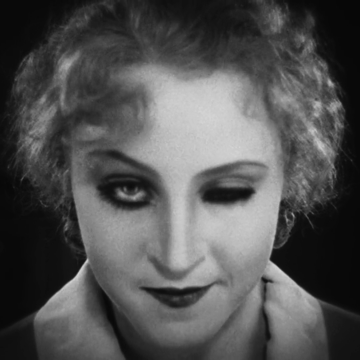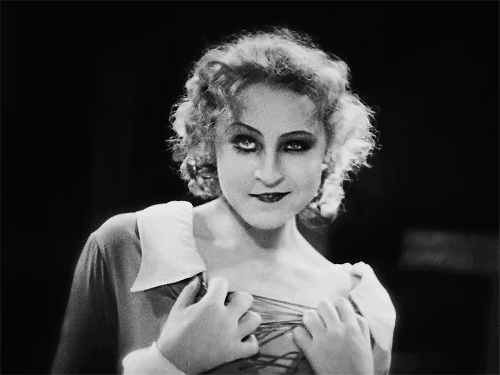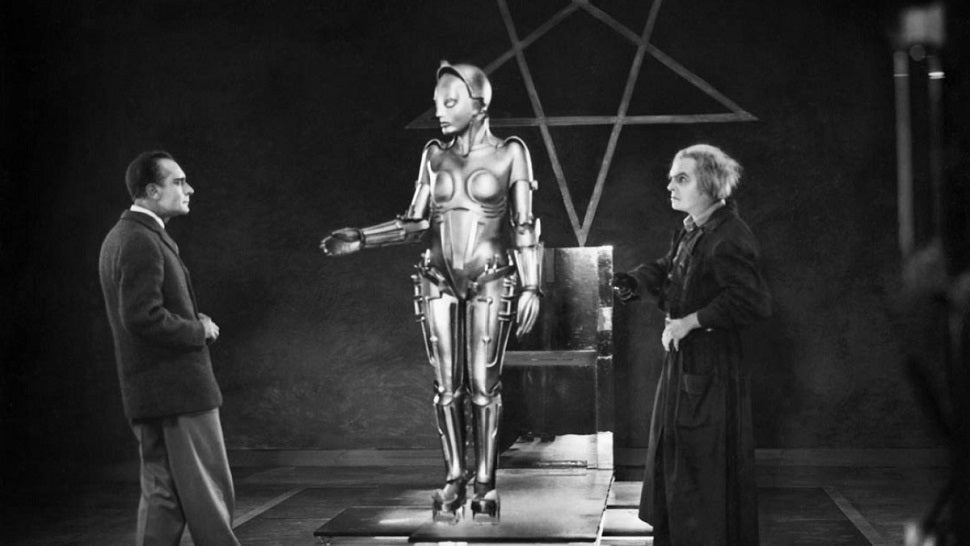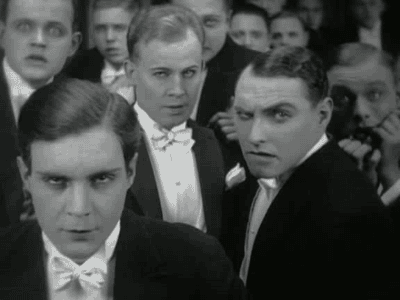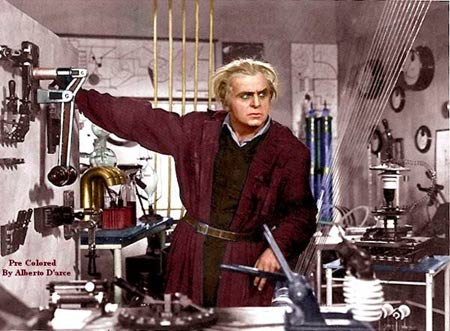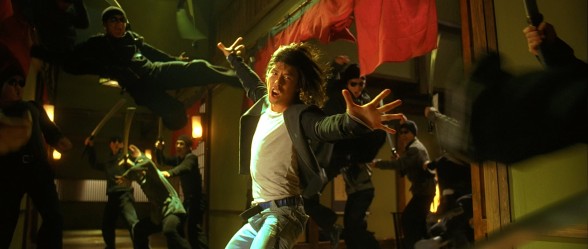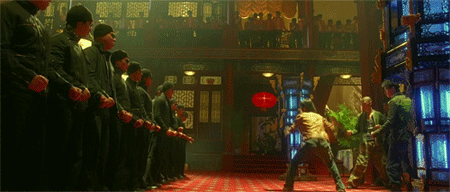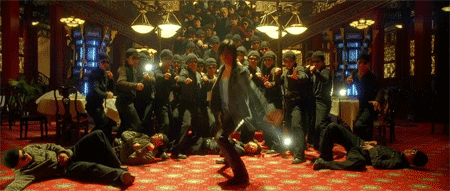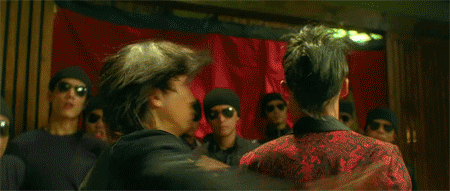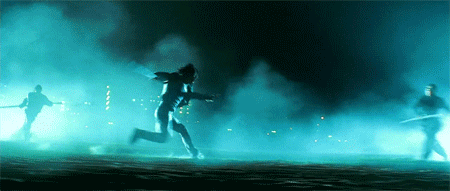Sci-Fi Drama / German / 1927
WHY'D I WATCH IT?
For the Sci-Fi Movie Countdown.
In the spirit of total transparency, I don't watch many black and white movies. In fact, the number of black and white movies I've seen can probably be counted on one hand.
Even less so for silent films. In fact, I've never seen one.
WHAT'D I THINK? *SPOILERS*
"The mediator between the head and hands must be the heart!"
I've long since been turned off by movies that lack recorded dialog because they're fundamentally less engaging if I'm distracted by the fact that black cards with text need to be put up after long periods of mute talking between characters. That and a complete lack of color only really serve to remind me that I'm watching a movie and reminding me that I'm watching a movie during anything other than an attempt to lampshade the fourth wall only serves to break my immersion.
Suffice it to say, I don't hold very high expectations for old movies, and it's not like Metropolis would convince me it isn't stuck in the past if it were in sound and color either.
Metropolis has a number of qualities indicative of very old movies such as the unrealistic speed the movie plays at, the erratic overacting to compensate for lack of being able to hear the urgency in their voices, and the eye makeup which I'm pretty sure exists only to emphasize facial expressions in the face of extreme contrast.
I don't think I was ever totally immersed in Metropolis,
but to honest, I was totally engrossed.
German Expressionism is a term I hear thrown around a lot and it's always been a sort of vague term used to refer to a sort of exaggerated presentation where reality is abstracted to appear surreal. If I was asked prior to watching Metropolis what German Expressionism looks like, I think I'd have trouble describing it, but now having seen it, I feel comfortable now simply pointing at the opening shot of the movie.
We're offered brief glimpses of whirring machinery and a ticking clock prior to a title card that informs us that it's "Shift Change" and we're presented with the image of rows of men, all in black, all downcast, all marching in uniform beat into one set of gates, while another row of men, leave them a second set of gates identical in every way save the fact that their march is just slow enough to be noticeable.
Instantly, I have a strong impression of what this world is like: the working lower class has been beaten into submission and obedience, there's no joy in what they do, and however gloomy they may be going to work, they're even worse coming out. These people are clearly oppressed and I haven't even seen the oppressors yet.
THIS is the style of film-making I appreciate most. It's artificiality is just barely realistic, but it telegraphs so much to me in it's focused approach that I can't not understand exactly what the movie wants me to think and feel about what's going on.
This style persists throughout much of the movie as we learn that these men are workers who live in "The Depths", a city beneath "Metropolis", where they work on the "Heart Machine", which powers the city and enables the wealthy upperclass like the so-called master of Metropolis, Joh Fredersen and his son, Freder (amusingly named Freder Fredersen). Even the names for things beyond the characters are pleasingly generic. We needn't have to open up a
Tolkien Dictionary to understand that Metropolis is the city, The Depths are it's underground, and the Heart Machine runs it all, they're named to be convenient and straightforward.
Not that it would be even remotely difficult to understand anything if they were given actual unique names other than descriptors, but generic names like these serve not only to identify, but to specify: Virtually nothing is told to us about what the Heart Machine is or what it does, but it's purpose is easily inferred.
Sure enough, we're given insight into the luxury of Freder and his life under the thumb of the hard-edged businessman Joh and we get a distinct impression of the classist inequalities in the system he manages through his demeanor and interactions with people.
A big thing I appreciate about the dialog cards is that they're ignored entirely during conversations where body language sufficiently portrays the characters' reactions and relationships with each other. There's no need to hear what's being said in most cases throughout the movie because only key lines of dialog are necessary to drive the plot or make sense of the action on screen. Honestly, I sort of wish the dialog cards were phased out further as the movie went on, but they're sparse as it is, so that's really only a nitpick.
Less of a nitpick is the overacting. As the movie goes on we learn that the workers are attending gatherings where they meet Maria, a woman who tells them a variation on the story of the Tower of Babel. She informs the masses that "the mediator between the head and hands must be the heart" which is a somewhat unsubtle metaphor about the morality that is necessary for a top-down government to work, which is made explicitly clear by the end of the film.
The overacting comes in where one of these gatherings is observed by Joh and his mad scientist buddy/rival/person, the unfortunately named Rotwang, and they conceive to sow discord in the underclass by replacing Maria with a robot body double.
When Rotwang pursues Maria with no clear intentions beyond shining a flashlight on her, we're witness to some of the most hilariously bad overracting I've seen. Maria goes mad with fear and the sped up footage only makes the chase look silly.
I'd be inclined to say this makes for the weakest performance in the movie, but the actor playing Maria goes on to steal the show when she also portrays the disturbingly lusty "Man-Machine" body double.
Frankly, the overacting is only really distracting insofar as you can suspend your disbelief that the Man Machine has an unrealistic ability for persuasion, which is honestly easier to accept when you can't hear what she's actually saying most of the time.
She inexplicably manages to both rile a mob and incite nearly all of the upperclass men to lust after her in blind infatuation. In this regard she must easily be one of the most destructive femme fatales ever put to film.
Whatever you think happens next is probably what happens, Metropolis isn't a terribly surprising movie, but what it manages to do with a predictable plot is tell a largely compelling, important, and coherent story about classism where the low rise up and the high fall down.
"Coherent" is perhaps the most arguable point there given Metropolis's tendency to venture directly into hallucinatory symbolism with little real regard as to why. Near the beginning of the movie, Freder witnesses an explosion in The Depths and the intriguingly designed machine that the workers are running becomes that of a giant gaping devil's maw which workers are being thrown into.
The symbolism is pretty obvious here, but similar incidents later on are just confusing and just raise the question of whether or not Freder is even mentally sound.
The Man Machine's dance sequence appears to come out of nowhere and lasts much longer than it really has any need to be, which is something I would say about much of the first two-thirds of the movie as well.
Many scenes are drawn out longer than necessary to get the given point across and it only hammers home the fact that Metropolis runs for a wicked 2 hours even in it's incomplete form.
I felt like the halfway point in this movie should have been about the time it was wrapping up, but even so the 2 hour runtime managed to also holster my previous assumptions about the movie due to it's age and limitations.
I've been watching the critically lauded
Kara no Kyoukai series and despite full voice acting, sound effects, color, exceptional animation, and even a run time averaging half the length of Metropolis, they bored me to tears.
I was never bored with Metropolis, and to think
I didn't even see the whole movie since many scenes were missing in the version I watched. The whole movie runs approximately 30 minutes longer and I can't really say I wasn't missing them.
It's a shame that Fritz Lang would go on to say he was disgusted with the movie, I'll admit it was perhaps overly simplistic in it's message, but it's still an important message, if not the best movie I've seen to tackle the topic. Supposedly the Nazis were a big fan of Metropolis and I can see why given their stylistic preferences, but hopefully that's the real reason Fritz disparaged it as much as he did, no one wants to admit they like the same thing as a Nazi.
It's kinda funny when you say it out loud though.
All told, I really liked Metropolis, and based on my impressions of the unfinished version, I'm certain I'll like the Restored Version when I see it.
I'm looking forward to it.
REWATCH UPDATE:
Heron, Peacocks, Kissing.
I've now seen an improved version of Metropolis with a couple different scenes restored. It helpfully bridges the gap between events and elaborates on all but one of the biggest scenes I missed before (I still haven't seen the fight between Joh and Rotwang).
A couple flaws have caught my attention this time around including a couple continuity errors. The message for Assistant Guy and Worker Guy is practically identical and contains only a glimpses' necessity of information, but it's shown repeatedly on screen to little benefit.
The relationship between Hel and Rotwang's robot is also tenuous at best given it's never explained. Was the Man-Machine inspired by her? Is that the implication? They put a fair amount of narrative weight on this point given this among other things including the cause for Rotwang's estranged relationship with Joh is unknown to us.
Perhaps most egregious is just how heavyhanded it winds up feeling when it contrives to have every worker in Metropolis forget about their children. Didn't they know that destroying the Heart Machine would drown the city? Wasn't abandoning the city part of the plan? You're gonna abandon it without your children? Fricken' morons.
I really can't overlook this point since I really can't adequately explain it away.
Besides that though, I still enjoyed the movie. Even longer this time, it still managed to keep my interest, but I'm still reluctant to sign off on it without having seen other Fritz Lang/German Expressionist movies like M or The Cabinet of Dr. Caligari.
We'll have to see.
Final Verdict: [Pretty Good]
